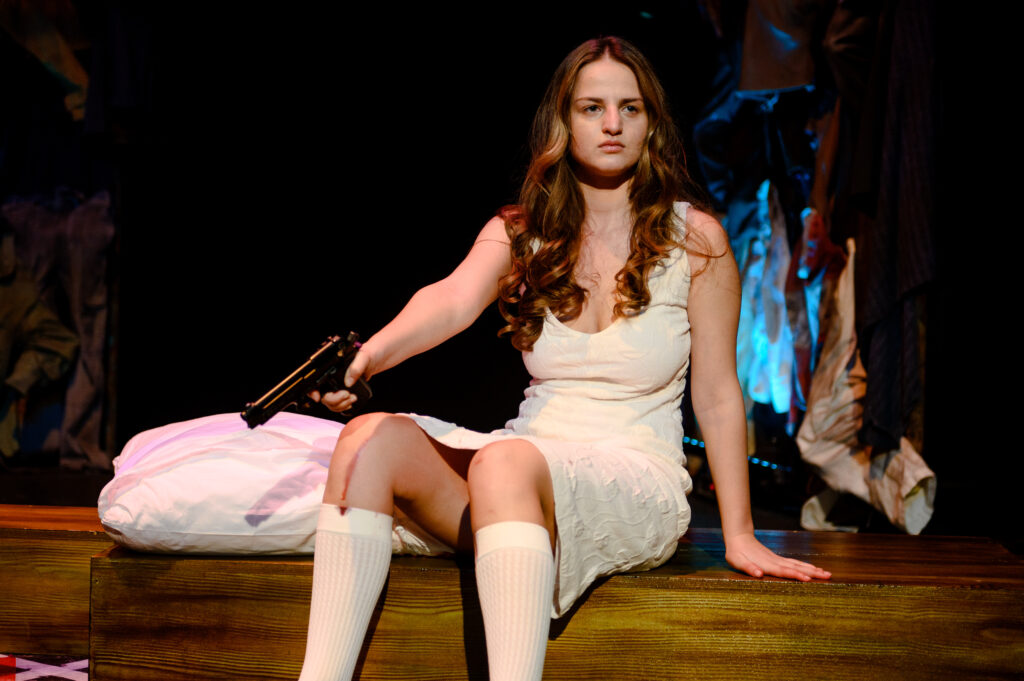Theatre maker Hana Rastoder talks to Nick Awde about 671-LOV, her play about aftermath of the Štrpci massacre and the need for Montenegrin writers to confront the trauma of war.
The answer as to why a play offers ways of telling a story that you might not find in a film, documentary or novel can be surprisingly practical. Certainly if you ask Hana Rastoder. “Theatre still has the ability to give you a complete, uninterrupted experience,” says the Montenegrin director/writer. “Everything that happens is more or less predicted. When you enter the space, you are asked to turn off your mobile phone, you only go to a break if the director plans it which means that the moment of pause is also staged. If you decide to leave the show, you stop watching and that also becomes part of the show whether you realise it or not.”
“It doesn’t mean that film, documentary, prose or poetry aren’t as powerful, but the mechanics of theatre are unlike anything else because they do not allow escape. I mean, one of my favourite devices that theatre and installations use is smell…”
Rastoder dives far deeper with 671-LOV, which premiered at the Montenegrin National Theatre in Podgorica. Her play examines the after-effects of a massacre that took place in Štrpci in 1993 when armed Bosnian Serbs took 20 non-Serbian men off a train and tortured then killed them. Justice has been slow and patchy and the event risked being forgotten – that’s unlikely to happen now thanks to the production’s platforming of the experiences of the victims’ families via a remarkable journey that took the play from degree text to the National stage.
Rastoder was studying theatre directing at the Faculty of Dramatic Arts in Cetinje when she was invited by the then director of the National Marko Baćović to direct her master’s play at the National. “Originally I had put forward a different idea but as time went on, I became more and more interested in writing a story about Štrpci. When I realised that I now had this unique opportunity to direct a play that I had written on Štrpci in the National Theatre in the 30th anniversary year of the crime itself, there was no going back.”
Since no directing student at the faculty had previously asked to direct their own text, it wasn’t certain that the project would be actually approved. Then Rastoder’s mentor Radmila Vojvodić passed it through and helped her to develop the text and direction. But the biggest challenges appeared when rehearsals began – although everyone in the team was enthusiastic about the challenge of working on such a difficult subject, no one could have guessed the emotional consequences, says Rastoder. “At the first reading rehearsal, I had already stressed to my team that I’m not responsible for everything that happens to them on that front and that they themselves should take care of their mental health. We tried to support each other, but dealing with the details of crime every day leaves a mark even on the most emotionally stable.
“Just before the premiere, we were all just waiting for everything to end, but then a completely different life of the play began. I have the impression that it’s getting easier for the actors, especially since we have got such good reviews and because the reactions of the audience has been mostly very positive.”
Rastoder sees the lesson being that a comfortable process does not necessarily guarantee quality. “If you allow yourself to be superficial enough not to touch on any of the issues you are talking about and supposedly dealing with, it means that you neither want nor need to express what harms you. But dealing with a crime is not possible from a comfortable position.”

671-LOV
The play premiered in 2023 close to the 30th anniversary of the 27th February 1993 massacre and later performances, at the National coincided with the January retrial in 2024 of four of the Serb gunmen – which was then postponed. “Of course the timing was intentional,” says Rastoder. “Among other things, the play represents the message that after 30 years no one cares whether or not the perpetrators will be sentenced or for how many years. When they should have been punished, they weren’t – and it doesn’t really matter so much to people now. The remains of the victims of this crime are still in Lake Perućac, and it is more important to talk about exhumation of their remains.
“With this play, a creative artistic act, we want to excavate the remains of the crime that has been perpetrated since 1993 against the victims’ families by delaying the trial and ignoring the request to investigate Lake Perućac. I’ll say it again: no one cares anymore whether a 60-year-old criminal will be sentenced to fifteen or ten years in prison. Today the lake is covered in cultural and tourist structures, while the process of draining it and exhuming the bodies would take three months, which is a month longer than the play’s rehearsals took. But let the draining of Lake Perućac begin and then we can talk further. So the play is a message to the authorities of Montenegro, Serbia and Bosnia and Herzegovina.”
671-LOV opened on the National’s Small Stage – chosen because it would create a more intimate atmosphere – with a cast that includes actors from outside the theatre. The National has a large ensemble but it has a lack of younger actors, so it often has to pay freelancers. It needed to be understanding with Rastoder over casting because the majority of the characters are younger people, and the performers are therefore a catalytic mix of Tihana Ćulafić and Dejan Ivanić from the National ensemble, independent Milica Šćepanović, and Jovana Brnović, Kristijan Blečić and Ognjen Sekulić who have completed their basic studies in drama and are now working on their master’s.
“In a work that tackles a difficult subject, all the roles in the production – performer, director, assistant, actor, costume designer, set designer – take on added responsibility, because it requires you to give more than you think you can,” says Rastoder. “It stops being a platitude when you realise that you can’t move or even speak after a rehearsal. No one would voluntarily enter the little black box of theatre to think about the feelings of victims and criminals for hours in a row unless they are crazy – or determined to exact some kind of justice.”
Individually, none of the cast has connections with the atrocity in the way that Rastoder has – a relative of hers was killed in Štrpci – but collectively, she says, “the actors took upon themselves the responsibility to research the subject and to ask for forgiveness on behalf of the people of Montenegro through such an artistic act. This isn’t a small thing, because in 30 years not a single politician has done this.”
There aren’t a huge number of Montenegrin plays or films about the wars of the 1990s and the trauma that followed. The first play to address the theme was Ljubomir Đurković’s Waste (Otpad), directed by Niko Gorščič, while the first play on the subject that Rastoder saw was The Son (Sin), directed by Mirko Radonjić, who explored the effect of the violence and war of the 1990s on people afterwards. The Son premiered in 2017 at Cetinje’s Zetski Dom Royal Theatre, and when Rastoder caught a performance in 2020, she remembers the experience helping her to make the inner decision that she would also write a play dealing with war trauma. Today the perspective has expanded somewhat with the appearance of Boris Liješević‘s Under Both Suns (Pod oba Sunca) in 2022, 671-LOV in 2023 and Petar Pejković‘s Death in Dubrovnik (Smrt u Dubrovniku) which opens later in 2024.
“I hope that these will not remain isolated cases,” says Rastoder. “I hope that Montenegrin writers will deal more often with the trauma of war in order to raise society’s awareness and to keep the dialogue about the past open and in this way prevent the utilitarianism of the past from enabling nationalist agendas today. The purpose of the culture of memory when it comes to the traumatic experiences of the community is raising critical awareness, and it also has a therapeutic effect.”

671-LOV
In the case of 671-LOV, the specific purpose is to address improving society’s collective relationship with the victims of war and also with the crimes of war. It deconstructs the national mythology by focusing on the experience of the victims’ families and the failure of the Montenegrin authorities, who have diminished the crime thanks to their low engagement in providing social assistance to the victims’ families, not taking the initiative to speed up the trial process, and persistently ignoring requests to investigate Lake Perućac. In the process, Rastoder establishes a critical yet honestly patriotic platform that uses the power of theatre to declare that anyone who has been wronged will not be forgotten.
Although 671-LOV deals with real events that primarily concern the countries of the former Yugoslavia region, Rastoder intends the play to send a more universal message about the meaninglessness of war through the intimacy of the story. “In fact, our position is that wars are not at all meaningless. It is only the victims that have become meaningless. We show how the authorities that generate the war profit from it and the people perish senselessly. It is a message that applies to what’s happening right now between Russia and Ukraine, Israel and Palestine. It’s also a warning that we need to keep a watchful eye on all world political events so that people can make smarter decisions that won’t bring bad, corrupt politicians to power.”
As director and playwright, Rastoder joins the audience for every performance. “I think it’s important to follow the life of the play together with the actors after the premiere. Every night is a new event that can teach you something, although it can be difficult to watch your own work in action because you’re the one who notices your mistakes the most. If a play isn’t important to me, then I shouldn’t make it. I don’t want to do it just for the money – although I do understand that approach – I want to do it to make revolutions in theatre with my colleagues.”
671-LOV actively adds to the wider documentation of Montenegro’s victims as well as of all those who suffered in the Yugoslav wars of the 1990s. Rastoder hopes that other Montenegrin writers will continue to add to the picture by creating work that unites the same ethical and aesthetic values. She adds, however, that it is a bigger challenge than it should be. “Documentation in Montenegro is easy to come by if you look for it. Little is hidden today but unfortunately we are the ones who deliberately deny ourselves knowledge about the negative points of our history and of our present and possible future because it makes life easier for us.”
There’s therefore a lot to unpack in the play, and this includes the title. The high-speed train from which the passengers were abducted on February 27, 1993 had the number 671 but it was better known by the name ‘Lovćen’. Rastoder settled on 671-LOV as her final title (‘lov’ also translates as ‘hunt’) because it sounds like something in code. “It refers to the secrecy of the organisation needed to commit such a crime, which was designed by the authorities at the time to move the war from Bosnia and Herzegovina to the border area of Serbia and Montenegro where a mixed population lived.”
That code suggests the concealment of the truth surrounding the case and also the lack of openness of the authorities and the public around it. Many people in Montenegro and Serbia have heard of the crime but hardly anyone actually knows the actual depth of its history – and so 671-LOV reveals the condensed details. “The stories of the victims and the experiences of the people connected to them who are living are all hidden behind numbers and letters. Revealing that tells us that the victims loved, lived, had families, planned the future, that they were not extremists but ordinary civilians whose only sin was their name.”
A significant moment of affirmation for the show was when the Council of Europe’s Commissioner for Human Rights Dunja Mijatović, who is Bosnian, attended with her colleagues. “They were in Montenegro on an official visit but they came because they wanted to,” says Rastoder. “Although they were familiar with the event, they had a strong emotional reaction to the play, which only confirms the power of theatre.
“I don’t think a visit by people like this is unusual, it’s actually far stranger that none of the Montenegrin politicians and ministers have shown any interest in the play. That says something, doesn’t it? Their ethical, human, professional obligation should be to follow culture and art, especially anything that looks at the traumatic spaces of the past. But if Montenegrin politicians don’t think a play like this concerns them, then I’m afraid that we have to think about whether they are good politicians.”
For more information, visit: CNP.me
Nick Awde is a journalist, playwright, editor, critic and producer. Based in the UK, he is co-director of Morecambe's Alhambra Theatre. Books include Equal Stages (diversity and inclusion in theatre), Mellotron, Women In Islam, and translations of plays by other writers. Much of his work focuses on ethnoconflict and language/cultural genocide.








